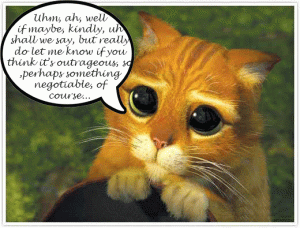
We’re on part two of the findings of my little research on what holds people back, when they set out to build their businesses. The first one was the impostor syndrome. Here is the m-word. Money.
Some of my respondents feel they had to overcome the fear of charging (some good) money for doing what they love to do. Interestingly, few people hesitate to charge money for what they don’t like to do. On first sight then, this seems to be a normal, justified way of thinking.
Think again.
The awkwardness of charging money for what we love doing makes sense, if we depart from the idea that payment is a form of compensation. Compensation for wasting our lives away, doing work that makes us feel miserable. In this case, it holds true that the greater the fun we have at work, the less we should earn. The more miserable we feel about our work, the more we should get paid.
Who is guilty?
The trouble with this perspective is that it somehow assumes that somebody other than we ourselves – namely the client/customer/employer – is responsible for our misery, is actually causing it by being interested in our product or service. Now, that does not sound like a very healthy relationship, does it? Nor does it sound very attractive for anyone.
So, for the sake of sanity, let’s assume there is such a thing as free will for all. We can choose to create a business around what we love doing. We can choose to follow our passion and make it our source of income. Equally, the clients or customers can choose.
Nobody can oblige them to buy any product they don’t want. Nobody can force them to hire a coach or a programmer. They choose to do so. And their choice is determined by the value they get for their money, the value they see in whatever we offer.
If we love the work we do, chances are we’ll do our work exceptionally well and we create a lot of value for our clients. If we hate what we do, most likely nobody will find much value in whatever service or product we offer. And again, what will somebody want to spend their money on? Value or no value?
We all benefit
In summary, being passionate about your work does not benefit you alone. It creates value for anyone, who can see the love you have for what you do. This does not even mean you have to be the very best in your field. Your passion, your love and your authenticity will reflect in everything you do and will create the most important sales pitch: trust.
This does not only apply to coaches and any services that involves a closer and/or more prolonged relationship with a client.
I have recently found myself in the situation to have to find a programmer to work on my webpage. There are thousands of options on the internet, of course, and I was confused. Some are word press experts with great expertise and experience. Others can do the job for very little money. I knew none of the people offering their services online.
I ended up choosing some guys from here in Kampala. The programmer is not a top notch expert for WP. And surely, I saw offers on Upwork and other platforms that were a lot cheaper. None of this mattered to me.
It’s about connection
I chose these programmers, because I love working with them. They love what they do and they are very open and honest about what they do and what they cannot do. I know them, I like them, and I trust them. I know they’ll get the job done somehow and, more importantly, whenever I need to sit down with them, I’ll enjoy it. I like the way they relate to me.
I am happy to pay what they’ve asked for, because I trust them. And because I like them I want to see them succeed and thrive.
So, don’t worry. Be authentic. You create value for your clients and customers. They will love to see you thrive for that.
